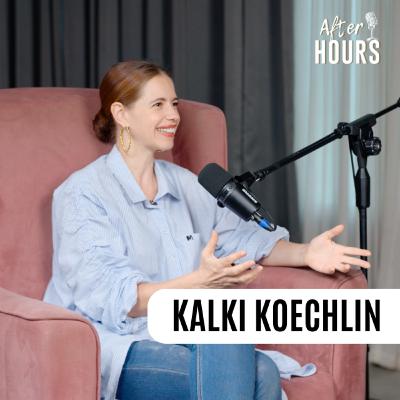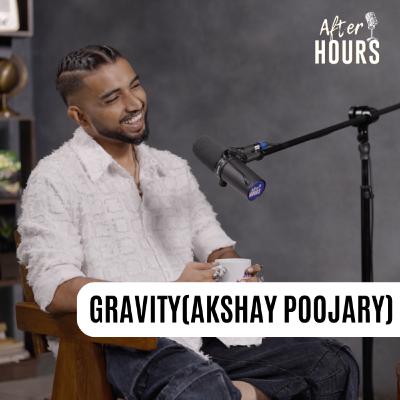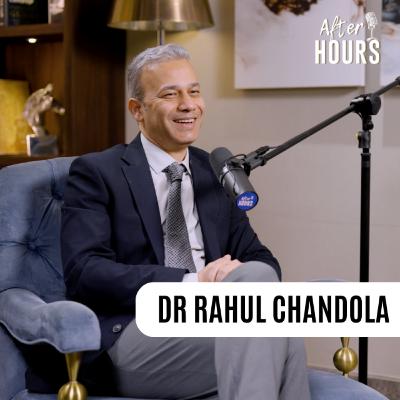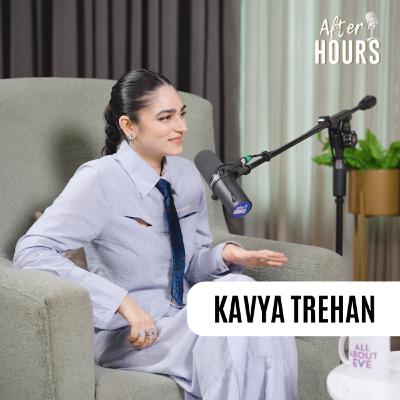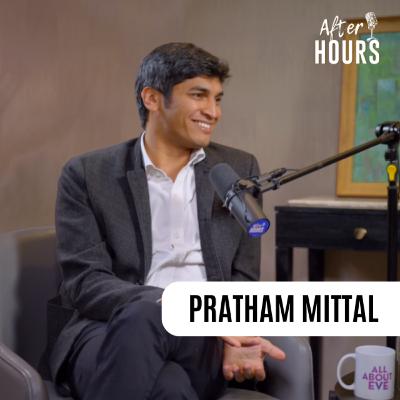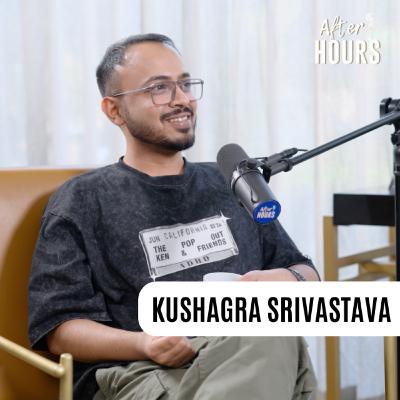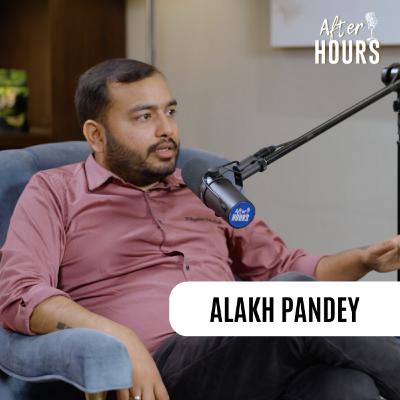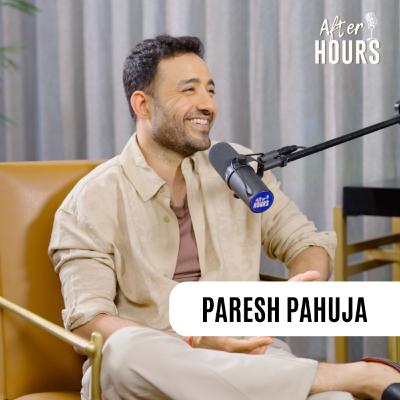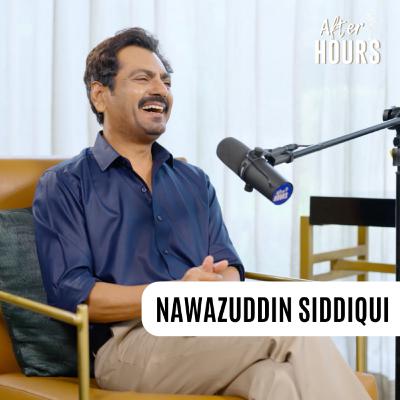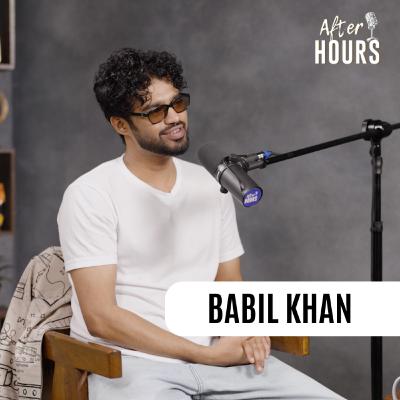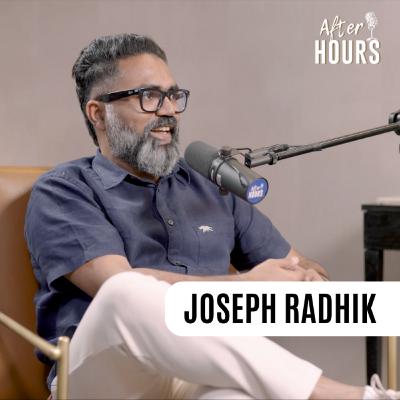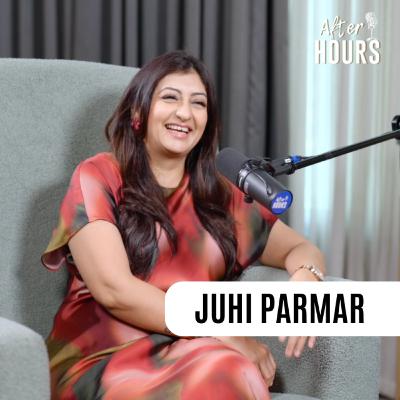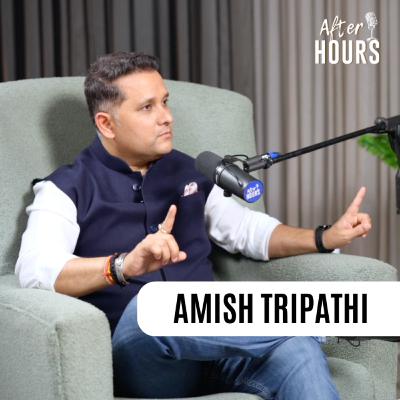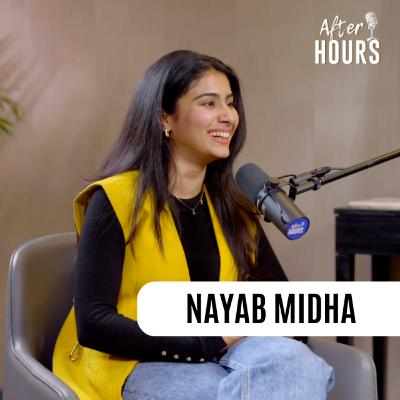Discover AfterHours with All About Eve
AfterHours with All About Eve

AfterHours with All About Eve
Author: All About Eve
Subscribed: 1Played: 25Subscribe
Share
© All About Eve
Description
Everyone has a podcast these days, we know. But AfterHours with All About Eve is different. We're not after virality, we're just trying to have a good conversation with interesting people. Whether it's Smriti Irani narrating hilarious stories about being jailed as Tulsi or Devita Saraf talking about how she deals with sexist uncles, AfterHours with All About Eve discovers a new side to people we all recognise. The world knows of their achievements, now, through AfterHours, they will know the person behind the celebrity.
Also available on YouTube, Apple Podcasts, and Google Podcasts.
Also available on YouTube, Apple Podcasts, and Google Podcasts.
87 Episodes
Reverse
In this episode of AfterHours with All About Eve podcast, Bani Anand sits down with the ever-versatile Kalki Koechlin for an interview that is both insightful and inspiring. From her unforgettable performances in 'Dev.D' to the beloved characters in 'Zindagi Na Milegi Dobara' and 'Yeh Jawaani Hai Deewani', Kalki opens up about crafting a career on her own terms.
Kalki Koechlin reflects on the price of staying true to her art, embracing theatre, and raising her child. She also discusses the dichotomy of fame, where her grounded lifestyle often surprises fans.
Kalki Koechlin reflects on the challenging phases in her career, from the post-'Dev.D' low, during which she focused on theatre and co-wrote 'Skeleton Woman', to facing typecasting and rejecting repetitive roles after hits like 'Zindagi Na Milegi Dobara' and 'Yeh Jawaani Hai Deewani'. Despite setbacks, these lulls fuelled her creativity, leading to projects like 'The Elephant in the Womb'. Kalki also opens up about a tough period of personal and professional strain, including a lack of work, housing struggles, and caring for her sick mother, while navigating divorce and financial pressure.
In this candid interview, Kalki Koechlin opens up about recognising when it’s time to walk away from a relationship, sharing how letting go led to some of the most transformative moments of her life.
Kalki Koechlin discusses the impact of social media on professional opportunities, sharing how some friends lost jobs due to fewer followers. Reflecting on her career before social media, she highlights the challenges young actors face today. The podcast also explores the negative effects of social media on children and teens, including anxiety, unrealistic beauty standards, and mental health issues.
In this podcast, Kalki Koechlin discusses her iconic role as Natasha in 'Zindagi Na Milegi Dobara', the myths surrounding her character, and her thoughts on relationships and self-growth. She also reflects on the end of 'Yeh Jawaani Hai Deewani' and shares her role in 'Made in Heaven' Season 2. Kalki gives insights into her latest project, 'Ghost Hunters', a paranormal thriller, and reveals how she unwinds with shows like 'Hacks' and 'Fleabag'.
(01:30) The price of living life on her own terms
(03:35) On 'ZNMD’ and 'YJHD’
(04:07) On Theatre
(05:14) Relationship with money
(09:09) Lows of life
(12:56) Saying no to work
(15:11) When everything fell apart for her
(17:33) On walking out of her relationship
(19:19) Meaning of self-work
(24:08) On motherhood
(26:13) On her book
(27:41) On unlearning
(29:18) On her daughter
(32:30) Social media
(35:02) The effect of social media on kids
(37:45) On the beauty standards set by social media
(39:32) On trolls
(40:50) On water birthing
(44:13) On recovery after giving birth
(46:10) What does being a celebrity mean to her?
(50:00) On her character Natasha in 'ZNMD'
(53:03) On the ending of 'YJHD'
(55:09) On 'Made in Heaven'
(55:56) What she is working on currently
(57:09) How does Kalki unwind AfterHours?
Follow Kalki on Instagram: https://www.instagram.com/kalkikanmani/
Follow Bani on Instagram: https://www.instagram.com/bani.g.anand/
Follow us:
Instagram: https://www.instagram.com/allabouteve_in/
Facebook: https://www.facebook.com/allaboutevein/
Website: https://allabouteve.co.in/
#kalki #kalkikoechlin #zindaginamilegidobara #yehjawanihaidiwani #interview #bollywood #entertainment #podcast #podcasting #podcasts #interview #interviews #devd #trending #bollywoodinterview
In this gripping episode of AfterHours with All About Eve, rapper Gravity—best known for his explosive performance of ‘Jalaluddin’ on MTV Hustle—sits down with Bani Anand to share his journey from being a struggling underground artist to becoming one of the most respected names in Indian hip-hop.When Gravity performed JalaluddinGravity opens up about the overwhelming response to ‘Jalaluddin’, a song that went viral and became synonymous with his name. He recounts how the lyrics came to him during a train journey after visiting his parents. The now-iconic line—“Duniya ko maine kaha get down on your knees, main Jalaluddin”—wasn’t the result of endless rewrites but pure instinct and flow. He wanted to write something that made people feel powerful, and he did just that.Gravity on MTV HustleWhen talking about MTV Hustle Season 2, Gravity calls it “life before and after” for many artists like himself, King, and others. Despite already being somewhat established, Gravity auditioned for Hustle to prove himself to a wider audience and to shed the underground tag. His decision was met with scepticism, but it paid off in ways that changed his trajectory completely.How does Gravity write his songs?The conversation moves into his songwriting process—how Gravity writes songs in 15–20 minutes when inspiration strikes, how he moved from writing without beats to working beat-first, and how the melody embedded in his rap helps him retain lyrics on stage. He also shares candid thoughts about fellow rapper Hanumankind, revealing their mutual respect and chemistry, and even a quirky detail: Hanumankind does 100 push-ups before every performance.Gravity's childhood and relationship with his fatherGravity also reflects on his childhood, growing up in modest conditions. His father ran a paan shop, where young Akshay (his real name) would observe customers and their behaviours—lessons that later informed his understanding of human nature and helped shape his lyrical voice. He shares a moving story about how, despite a distant and disciplined relationship, Gravity's father silently expressed pride in him by showing off his published article in Mumbai Mirror to shop customers.He also speaks about Samantha Ruth Prabhu, who once shared a photo of him along with his track Jalaluddin that helped her during a dark period. Toward the end on the interview, Gravity opens up about what he looks forward to: releasing insane music, dropping his upcoming project Bombay Trilogy, and dreaming bigger with every step. He also shares how he unwinds after the chaos of the music world—by cooking and relaxing with friends.(00:00) Episode begins (2:23) Reactions to ‘Jalaluddin’(2:58) How is he feeling today?(4:10) On MTV Hustle(5:30) How Gravity views Hustle as a platform(7:22) On King and his journey(8:24) On songs from Hustle Season 2(8:45) Writing ‘Jalaluddin’(11:25) On writing songs quickly(11:58) On Hanumankind(12:39) One thing we don’t know about Hanumankind(13:05) Does Gravity forget lyrics on stage?(14:19) Where does his inspiration come from?(15:46) Has hip-hop evolved the way it should?(16:38) Is there money in hip-hop?(18:22) What’s common between Akshay and Gravity?(20:38) On heartbreak(23:44) Does disrespect fuel his art?(25:26) His relationship with his father(27:58) How important is his father’s validation?(31:56) On losing his father(33:26) On being detached(35:17) Lessons learnt post-Hustle(38:48) On beefs in the Indian hip-hop scene(42:12) Gravity's top five rappers(45:53) On Samantha Ruth Prabhu(48:19) His new project ‘Bombay Bazar’(51:07) Does manifestation work for him?(55:44) How does he unwind AfterHours?(56:38) GameFollow us: Instagram: / allabouteve_in Website: https://allabouteve.co.in/#gravity #jalaluddin #mtvhustle #hustle #hustle2 #mtvhustle4 #mtvhustleshow #hiphop #indianhiphop #hiphopmusic #interview #dhh #podcast #grav #king #kinggrav
Heart attacks in the 30s and 40s used to be unheard of, so why are more and more young people dying of cardiac ailments now? In this episode of AfterHours with All About Eve, host Bani Anand is joined by Dr Rahul Chandola, one of India’s leading cardiothoracic surgeons, for a much-needed conversation around the epidemic of heart disease, particularly among young people.With over two decades of experience and more than 1,000 open-heart surgeries for underprivileged patients, Dr Chandola brings clarity, compassion, and hard facts to a topic often clouded by myths and misinformation.The Link Between COVID And Heart AttacksDr Chandola explains how individuals who had COVID are at a significantly higher risk of developing atherosclerosis (plaque formation in the arteries of the heart), with effects that can last up to 18 months. He also clears up common misconceptions around whether vaccines increase the risk of heart attacks.Stress, Lifestyle & Corporate Burnout:We examine the link between mental health and cardiac health. Why are high-performing, driven professionals more prone to heart attacks? Dr Chandola clarifies that it’s not ambition itself, but unmanaged stress and sedentary habits that pose the real danger.Preventive Heart Screenings for the Young:Should you have your heart screened before turning 40? If you have a family history, high stress levels, or chronic anxiety, the answer is a resounding YES.Nutrition Then vs Now:Are we eating our way to heart disease? Discover the stark difference between traditional Indian diets and today’s processed, packaged, and fried food culture. Dr Chandola also weighs in on the ongoing debate: vegetarianism vs non-vegetarianism, alcohol vs smoking—what truly harms your heart more?New-Age Medical Technology & Real-Time Heart Monitoring:Dr Chandola introduces us to cutting-edge wearable biosensors—like wireless ECG patches—that stream heart data to the cloud in real time. These innovations are poised to transform early detection, insurance structures, and personalised cardiac care.On Broken Heart Syndrome & Human Emotion:The episode concludes on a powerful note. Dr Chandola sheds light on Broken Heart Syndrome—a real cardiac condition caused by intense emotional trauma, such as the loss of a loved one.(00:00) Episode Begins(02:00) Explaining the rise in heart disease(03:27) What is atherogenesis?(05:25) How has nutrition changed over the years?(07:08) Are ambitious people more at risk?(08:35) Does COVID raise heart attack risk?(09:51) Did COVID vaccines lead to more heart issues?(11:40) Why are young people having heart attacks?(13:16) Early warning signs of a heart attack(15:55) Why are people getting heart attacks at the gym?(17:21) Should young people have heart check-ups?(18:31) Traditional diets vs modern nutrition(20:55) Smoking vs drinking – which is worse?(22:14) Is alcohol safe for heart health?(23:45) Vegetarian vs non-vegetarian – what’s better for the heart?(24:54) Latest technology for heart monitoring(33:13) How tech could affect insurance(34:13) Why Dr Chandola chooses to serve society(38:29) When doctors were seen as gods(39:53) The value of giving back(42:01) A heartbreaking story from a health camp(49:21) Connecting patients and donors(50:45) The state of healthcare in India(54:16) Thoughts on heart transplants(55:00) How organ donation works in India(58:02) His first heart transplant experience(58:51) On Grey’s Anatomy(01:00:21) Risks of self-medicating(01:04:45) How Dr Chandola unwinds AfterHours(01:06:25) What is Broken Heart Syndrome?Follow us: Instagram: / allabouteve_in Website: https://allabouteve.co.in/#heartattack #heartdisease #heartpatients #heartproblems #heartattackawareness #brokenheart #covid #covidvaccine #covid19
'The Royals' has been a royal rage on Netflix. And we caught up with Kavya Trehan who plays the delightful Princess Jinnie. In the latest episode of AfterHours with All About Eve, actor and musician Kavya Trehan opens up about life after the success of *The Royals*—a show that not only introduced her to a wider audience but also marked a pivotal shift in how she is now perceived as both an actor and an artist. Kavya delves into the emotional and creative journey of becoming Jinnie—a vibrant, multi-layered, and quietly complex character. From keeping a diary in Jinnie’s voice to using fashion as a key tool in character-building, she shares how she envisioned Jinnie as a shapeshifter—bubbly on the surface, but concealing a deeper, more introspective side. She also discusses the responsibility of portraying a queer character, particularly with a strong LGBTQIA+ following for her music, and how she approached the role with sincerity and care, avoiding stereotypes. Her on-screen dynamic with co-star Lisa Mishra, who played her love interest, developed naturally over the course of filming—something Kavya believes added real intimacy and truth to their scenes.What Zeenat Aman told Kavya Trehan about loveIn this interview, Kavya also shares thoughtful insights about her co-actors—Ishaan Khattar’s discipline, Bhumi Pednekar’s warmth and generosity, and a particularly poignant moment with the iconic Zeenat Aman. Kavya shares how a simple question from Zeenat Aman shifted her entire understanding of love, support, and emotional safety within relationships.Beyond The Royals, Kavya offers an intimate glimpse into her inner world. She reflects on her spiritual evolution—how she moved from being a devout atheist to identifying as agnostic. No longer viewing belief through a transactional lens, she now associates faith with possibility, free will, and self-belief. This shift was guided, in part, by The Artist’s Way, a book that introduced her to manifestation, journalling, solitude, and daily rituals.Kavya Trehan's musicMusic remains central to who she is. Kavya gives viewers a peek into her current playlist full of bold, high-energy tracks and talks about the intentional music choices she made while preparing for Jinnie, from K-pop and Bossa Nova to French ballads. When Kavya auditioned for The RoyalsShe also shares the story behind her audition for The Royals, which began in English before being adapted into Hindi. Fluent in French as well, Kavya brought those nuances into the performance, especially as Jinnie’s character had a French boyfriend in the show. (00:00) Episode begins(2:38) After 'The Royals'(3:50) Role of costume in building a character(4:16) On her character Jinnie in The Royals(6:17) Humour as a coping mechanism(7:30) Self-conscious vs. conscious of the self(9:28) Being agnostic and thoughts on God(11:37) On unanswered prayers(12:26) What is Kavya Trehan manifesting?(16:13) On losing a parent(19:05) Is she proud of herself?(21:30) Kavya Trehan’s current playlist(23:07) Playing a queer character(25:05) Her dynamic with Lisa Mishra(26:17) Best compliment from her sister(28:30) Compliments after 'The Royals'(29:03) On Zeenat Aman(30:18) Advice from Zeenat Aman(32:20) When Kavya fell from a horse(34:35) Working with Ishaan Khatter(36:34) On Bhumi Pednekar(37:29) Internet hate and trolling(39:36) Working on her EP Hyperreal(46:32) What is garage music?(47:02) Kavya’s music genre(47:40) Biggest income source for musicians(50:06) Kavya’s income sources(52:04) Why Kavya doesn’t sing in Hindi(52:41) Audition for 'The Royals'(53:45) Would she sing a Bollywood song?(55:33) Work and visibility after 'The Royals'(58:24) How Kavya Trehan unwinds AfterHours(1:03:38) GameFollow us: Instagram: / allabouteve_in Website: https://allabouteve.co.in/#interview #podcast #bollywood #bollywoodinterview #zeenataman #theroyals #ishankhattar #bhumipednekar #musicpodcast
From Dehradun to Mumbai, from pageants to becoming a household name on Indian television, Asha Negi’s journey has been anything but ordinary. In this episode of AfterHours with All About Eve, hosted by Bani Anand, Asha opens up about the hustle, heartbreak, self-discovery, and second chances that shaped her career and identity.Winning Miss Uttarakhand gave Asha the confidence to move to Mumbai, despite her family’s initial hesitation. But her early struggles in Mumbai and navigating auditions and rejections led to a period of self-doubt. Asha's first major break came with Bade Achhe Lagte Hain, a pivotal moment where she worked alongside television icons Ram Kapoor and Sakshi Tanwar.The reality of the casting couch in TVAsha speaks openly about the casting couch, sharing the difficult truths many young actors face. She emphasises the importance of setting boundaries, staying grounded, and never letting desperation override one’s self-respect.Working with Ekta Kapoor and moving to OTTAsha also shares her admiration for Ekta Kapoor, admitting she was initially intimidated by her. But over time, she discovered the warmth and humour behind Ekta’s powerful image. It was Ekta who gave Asha one of her biggest opportunities, and Asha credits much of her success and recognition to the world of Pavitra Rishta that Ekta built.As the industry shifted from traditional television to OTT platforms, Asha had to adapt and reinvent herself. She speaks about the difference between “TV Asha” and “OTT Asha,” and how attending acting workshops helped her unlearn theatrical habits and embrace more nuanced, internalised performances.Criminal Justice and working with Mohd Zeeshan AyyubAsha Negi's work on Criminal Justice marked another phase of growth. Though her role was brief, collaborating with actors like Zeeshan Ayyub and Pankaj Tripathi was transformative. Asha describes Zeeshan’s humility and natural brilliance, and how Pankaj Tripathi’s calm and grounded energy left a lasting impression.This podcast also delves into her personal life—her experiences navigating the casting couch, the importance of drawing boundaries, her perspective on nepotism, and the societal pressure to marry. Asha Negi’s story is a powerful reminder that growth takes time, courage, and constant reinvention. Whether you’re an aspiring actor, a long-time fan of Pavitra Rishta, or simply trying to find your way—this episode will move and inspire you.Timestamps:(00:00) Episode begins(03:30) Winning Miss Uttarakhand(05:17) Persuading her parents to let her move to Mumbai(07:49) Asha Negi's first audition(09:08) First television role in Sapno Se Bhare Naina(10:20) On Bade Achhe Lagte Hain, Ram Kapoor & Sakshi Tanwar(13:19) On Pavitra Rishta(15:19) The influence of beauty pageants(20:08) Feeling like a misfit in the industry(23:44) How women can protect themselves from the casting couch(25:47) Her experience with the casting couch(29:01) What she learnt from Ekta Kapoor(30:50) Still recognised as Purvi from Pavitra Rishta(31:44) Popularity on television vs. OTT(32:44) Award show experiences(35:01) Working with Ankita Lokhande(35:26) On Sushant Singh Rajput(36:12) Asha's work with Hiten Tejwani(37:37) Does television pay well?(38:20) On Criminal Justice and Pankaj Tripathi(39:15) Acting alongside Mohd Zeeshan Ayyub(40:37) Transitioning from ‘TV Asha’ to ‘OTT Asha’(45:30) Growing from her 20s to her 30s(50:37) Insecurity and self-doubt in her 20s(52:26) Cringing at old performances(55:04) How Asha Negi unwinds AfterHours(56:46) On Criminal Justice(57:55) Would she ever go on Bigg Boss?(59:03) GameFollow us: Instagram: / allabouteve_in Facebook: / allaboutevein Pinterest: / allabouteve_in Website: https://allabouteve.co.in/#pankajtripathi #ektakapoor #ashanegi #pavitrarishta #pavitrarishtashorts #dailysoap #indiandrama #podcast #interview #allabouteve #podcasting
In this thought-provoking episode of AfterHours with All About Eve, hosted by Bani Anand, entrepreneur Pratham Mittal opens up about his unique journey, his philosophy on work and life, and the hard-earned lessons that have shaped his career. Growing up in Jalandhar, surrounded by a community where entrepreneurship was part of his daily life, Pratham shares how early exposure to business conversations — from trading to profit-making — instilled in him a natural curiosity for building and innovating.The conversation delves into his key takeaways from building start-ups, including his experience with the Neta App — a platform designed to rate politicians, which taught him powerful lessons about behaviour change, technology, and the challenges of trying to bring accountability into India’s political landscape. He speaks candidly about the reality of seeing a promising idea struggle because it required too great a shift in people’s fundamental behaviours.Pratham also discusses the myth of product versus service businesses. He admits that, for years, he pursued the allure of product companies, believing service businesses were less scalable or impactful.Throughout the interview, Bani and Pratham delve into deeper questions: What percentage of success is due to luck, intelligence, hard work, or critical thinking? How do entrepreneurs create their own luck? And what is the balance between delusion and vision when attempting world-changing ideas like Elon Musk’s?Pratham also speaks passionately about education — his current area of focus through the Master's Union — and why he believes schools and universities need to shift from merely teaching and testing to genuinely nurturing young minds. In one of the most inspiring moments of the interview, Pratham shares his experience of meeting Zerodha’s Nithin Kamath — a reminder that humility is often a defining trait of the most successful people. He recalls how Nitin Kamath responded to a cold WhatsApp message, invited him for a meeting, and treated him with respect and genuine curiosity.The podcast also touches on privilege, failure, and the value of setbacks in developing resilience. Pratham reflects on how his time at boarding school and enduring difficult periods in business helped him build humility and self-awareness. They also discuss how everyone born with privilege should face at least one major setback to gain perspective on life.Finally, Pratham opens up about what gives his life meaning today — his commitment to transforming education, his nightly routines, and how he unwinds AfterHours. He shares what inspires him: the visionary leadership of figures such as Sheikh Mohammed bin Rashid Al Maktoum, who transformed Dubai from a struggling state into a global centre of progress and innovation.(00:00) Episode begins(3:14) Why he doesn’t work with his family(4:33) What Jalandhar taught him about business(7:18) Business ideas he wishes he’d thought of(9:07) Product vs service business(10:43) Hammerhead shark story(14:02) We crashed, and the delusion needed for success(16:00) Purpose of life and Elon Musk(17:57) The pressure of always being ‘on’(21:23) How much does luck matter?(23:14) Creating your own luck(24:27) What is critical thinking?(25:55) Lakshmi and Saraswati's story(29:29) His worst experience as an entrepreneur(35:34) How the Neta App was hacked(37:52) Boarding school grounding and a Bollywood actor’s story(41:40) How he ensures students are equipped for life(42:21) Why schools fail to nurture(46:39) Humility in success + Nithin Kamath story(49:20) ‘First builds it, second grows it, third loses it’(52:47) Business family vs family business(55:14) On being detached(58:12) Outgrowing parents as an entrepreneur(58:39) On heroes and role models(1:06:33) How he unwinds AfterHoursFollow us: Instagram: / allabouteve_in Facebook: / allaboutevein Pinterest: / allabouteve_in Website: https://allabouteve.co.in/
In this episode of AfterHours with All About Eve, Bani Anand sits down with Shriya Pilgaonkar to talk about how life shifts when you move from your twenties into your thirties. Shriya explains how she used to follow social media checklists for validation and how she’s more confident now, sets clear boundaries, and tackles problems early. From playing Sweety in Mirzapur to landing a part in Fan through surprise auditions, she shows how hard work, practice, and a dash of good timing can help build a lasting career.Looking back on her twenties, Shriya recalls staying in tough or awkward situations because she thought she’d learn from them. Now, she knows when to speak up and when to walk away. She also admits that she used to play the “saviour” in her relationships and tried fixing her partner’s problems. But since then, she has learnt the value of asking for what she needs, which has brought more balance and honesty to her love life.When it comes to romance, Shriya maps her journey from the rush of first crushes to the calm security she values now. She’s inspired by her grandparents’ arranged marriage that lasted decades, and she encourages women to make the first move if they feel like it. Authenticity, she says, matters more than waiting for someone else to approach you.Shriya also talks about working in the digital age, praising her collaboration with Bhuvan Bam on Taza Khabar. She loves how content creators now write, produce, and star in their own shows—breaking down old barriers and letting fresh voices shine.As the conversation winds down, they explore legacy, luck, and longevity. From dancing with Shah Rukh Khan on “Chaiyya Chaiyya” and working with him in the movie Fan to aiming for a long career like her father’s, Shriya stresses that hard work opens doors, but the right moment makes everything click. She reminds us that control is an illusion, and sometimes surrendering to life’s flow is the best strategy.Finally, Shriya shares her grounding habits: journaling to sort her thoughts, solo travel to reconnect with nature, and even a quick look at a Milky Way Galaxy's picture on her phone when she’s feeling overwhelmed. She admits to 'emotional eating' after a long shoot and highlights the importance of switching off. For her, true success isn’t just awards or views—it’s the peace you find within every high and low.(00:00) Episode begins (03:03) On Mirzapur & feeling grounded in her 30s(06:11) 20s vs 30s(08:50) Outgrowing friendships(10:54) Are friendship break-ups harder?(12:08) Friendships, space & silence(14:52) Love in her 20s vs 30s(17:35) Being a giver in love(18:16) Saviour complex in relationships(19:45) Why women hesitate to ask for more(20:36) Making the first move(22:52) Struggling to surrender — even in love(25:03) On working with Shah Rukh Khan(28:03) How she got 'Fan'(29:16) “I want to be here for decades”(30:54) The role of luck(32:44) Staying in power(33:19) Healthy competition(34:39) How she got Guilty Minds(36:23) Virality & social media(38:28) On struggle(38:58) Feeling deeply as an actor(40:04) Is acting narcissistic?(41:00) Her grounding practices(43:26) Being present while acting(48:27) What success means to her(49:23) On Bhuvan Bam & influencer-actors(51:38) Creating your own chances(54:59) How Shriya Pilgaonkar unwinds AfterHours(57:35) GameFollow us: Instagram: / allabouteve_in Facebook: / allaboutevein Pinterest: / allabouteve_in Website: https://allabouteve.co.in/#shorts #srk #shahrukh #shahrukh_khan #shriyapilgaonkar #mirzapur #interview #bollywood #bollywoodinterview #bollywoodgossip #podcast #podcasting #podcastclips #chaiyachaiya
From performing with Kareena Kapoor in Tareefan Reprise to working with Ishaan Khatter and Bhumi Pednekar in The Royals, Lisa Mishra has come a long way. And she's not stopping anytime soon. In this expansive, emotional, and at times hilarious episode of AfterHours with All About Eve podcast, singer-songwriter and Netflix star Lisa Mishra joins Bani Anand for a conversation that is equal parts soul-baring and unfiltered. Lisa reflects on her remarkable journey — she grew up in a traditional Indian household in the United States and had a secure job in data analytics before she took a leap of faith to pursue music full-time in India. That leap led to viral success with her cover of Tareefan, acting opportunities, and now a globally trending Netflix series, The Royals, which recently broke into the Top 3 worldwide.She shares what it was like to fly to India to record Tareefan with Sonam Kapoor and Kareena Kapoor, battling nerves and obsessively memorising lyrics for 23 hours straight on the plane, feeling as though she were still auditioning. She fondly recalls how Kareena Kapoor was surprised that Lisa was singing live during the Tareefan shoot. She also reflects on the organic success of her duet Mujhe Tum Nazar Se with Adarsh Gourav, a song that continues to gain traction.Working with Zeenat Aman, Ishaan Khatter and Bhumi Pednekar on The RoyalsThe podcast also delves into her time on the set of The Royals, where she worked alongside legendary figures such as Zeenat Aman, whose poise and presence left a lasting impact. Lisa expresses her admiration for Zeenat Aman’s Instagram, a blend of vintage Bollywood charm and modern storytelling. Lisa speaks with moving honesty about the emotional toll of success, including the loneliness of being far from her family, and the importance of her inner circle. A touching anecdote involves her connection with actor Paresh Pahuja, with whom she toured on Voice Notes — a project done purely for the joy of it. She gets candid about the darker side of ambition: moments of doubt, burnout, and the deep yearning to simply rest.As the interview unfolds, Lisa also shares exciting details about her upcoming music, including her song Teri Hoon, a heartfelt, stripped-down track that brings her back to her roots with live instruments and emotional vulnerability, reminiscent of her early YouTube days. She talks about resisting trends like inserting viral dance hook steps into every track, choosing instead to stay authentic.(00:00) Episode begins(2:53) Lisa on The Royals & fan reactions(4:01) Working with Zeenat Aman(7:05) Flying to India for Tareefan Reprise(10:07) Are her parents proud?(12:22) Why do women doubt their success?(15:06) Independent artist vs. working with a label(17:36) New song: Teri Hoon(20:13) Tareefan & 'Mujhe Tum Nazar Se' with Adarsh Gourav(25:30) Lisa Mishra's celebrity crush(26:40) Reacting to Ishaan Khatter's shirtless scenes(27:10) Riding a horse for The Royals(28:18) Portraying love on screen with Kavya Trehan(30:30) How Lisa knows someone’s into her(33:43) How to recognise "the one"(34:56) Dating in your 30s(37:36) On working with Kareena Kapoor(38:58) Today’s superstar potential(43:48) Why Lisa needs a break(46:15) Bond with Paresh Pahuja(47:01) Making friends as an adult(51:32) Dealing with “enemies”(52:18) Does Lisa ghost people?(52:40) Has she been ghosted?(53:37) Accepting flaws(54:58) Back to roots: Teri Hoon(57:29) How Lisa Mishra unwinds AfterHoursFollow us: Instagram: / allabouteve_in Facebook: / allaboutevein Pinterest: / allabouteve_in Website: https://allabouteve.co.in/#theroyals #netflix #lismishra #kareenakapoorkhan #zeenataman #interview #podcast #ishankhattar #bollywood #bollywoodinterview
In this delightfully candid episode of AfterHours with All About Eve, stand-up comedian and writer Kushagra Srivastava sits down for an honest chat about life behind the jokes.The Pretty Good Roast Show: Behind The ScenesKushagra shares behind-the-scenes insights into writing jokes for The Pretty Good Roast Show, especially for non-comic guests, how some celebrities (like Kusha Kapila) came exceptionally well-prepared, and the hilarious inner workings of writing as a team with Kaustubh and Rohit — and what exactly Aashish Solanki was doing while they wrote.One of the episode’s highlights is when Kushagra pays tribute to fellow comic Maheep Singh — someone he considers deeply influential. He talks about Maheep Singh's career in comedy since 2010, his brief break during COVID, and most memorably, Maheep Singh's brilliant line “Mummy kaisi hai?” on The Pretty Good Roast Show.The Dark Side Of Social MediaThe conversation takes a deeper turn as Kushagra opens up about the darker side of internet fame — negative comments, trolling, and the strange confidence people get when hidden behind screens.Dating In 2025, From A Man's POVWe also explore the male emotional landscape: how men deal with heartbreak, the ways in which male friendships offer support, and why most break-up conversations end with "bohot badiya hua, ab chill kar." From dating dynamics to communication struggles, Kushagra talks about being ghosted, ghosting others, and the strange ecosystem of dating apps — including the bizarre bios, performative politeness, and how the dating bar for men is so low that basic decency is now considered “gentlemanly”. He also shares what he sees as green flags (people who don’t take themselves too seriously) and red flags (those who can turn on anyone without warning).Life As A Stand-Up ComedianAs the episode comes to a close, Kushagra talks about the loneliness of stand-up comedy — the solo travel, the solo shows — and whether he’d still be doing it if it weren’t financially viable. And if you’ve seen him on Tanmay Reacts(Tanmay Bhat's show), you’ve probably wondered why he’s called Kidnapper OP. Kushagra reveals the inside joke behind the nickname. His answer? It’s the love for the craft that matters most. He also opens up about what brings him joy, how he unwinds AfterHours, and what he hopes to keep building as a writer and performer.(00:00) Episode begins(2:16) Why did it take so long for Kushagra to be recognised online?(2:57) How did Kushagra become a comedian?(5:18) Writing for The Pretty Good Roast Show (6:15) Are comedians scared nowadays?(7:22) Dealing with online hate and trolling(10:45) Who does he confide in?(11:15) Male vs female friendships – handling emotional struggles(14:55) Do men actually want strong, independent women?(18:55) Worst thing Kushagra has read about himself – and post-breakup relief(20:10) Best part of stand-up comedy(21:43) Does he ever feel envious of other comedians?(22:30) On Maheep Singh and the ‘Mummy Kaisi Hai’ moment(25:49) Why is he called Kidnapper OP on Tanmay Reacts?(26:22) His relationship with his parents(28:41) Sanya Malhotra being rejected by Dance India Dance(30:36) How would he present himself on a reality show?(33:50) Has Kushagra ever ghosted someone?(37:02) Does ‘Hassi Toh Phassi’ work in real life?(40:28) Why stand-up comedy can feel lonely(42:21) Dating apps and the strangest bios he’s seen(47:54) Green flags in people(48:23) Red flags to watch out for(48:38) Would he still pursue comedy if it didn’t pay well?(51:51) How Kushagra unwinds AfterHoursFollow us: Instagram: / allabouteve_in Website: https://allabouteve.co.in/#prettygoodroastshow #roast #maheepsingh #standupcomedy #standupcomedian #kushakapila #tanmaybhat #tanmayreacts #podcast #interview #comedy #roastshow
In this compelling episode of AfterHours with All About Eve, we sit down with Alakh Pandey, widely known as Physics Wallah, for a conversation that goes far beyond academics and exam preparation. This isn’t just a story about cracking IIT or building an edtech empire, it’s a heartfelt exploration of India’s educational crisis, the emotional cost of social mobility, and the inner life of a teacher carrying the hopes of millions.Physics Wallah on the Indian education systemWhy is it that, in India, every second child is expected to become a doctor or engineer? Alakh Pandey begins by unpacking this cultural obsession — a reflection of a society that equates job security with success. But what if the very system people are trying to succeed within is broken? With more than half of Indian schools still lacking access to computers, and children requiring tuition despite attending school, Alakh Pandey argues that the education system has deeply failed both its learners and its educators.Alakh Pandey's insecurities despite the success of Physics WallahSharing candid memories from his modest upbringing, Alakh recounts how he once owned only two pairs of jeans and how, even today, spending money can make him feel uneasy. Despite his financial success, Alakh Pandey admits he often wrestles with the emotional residue of a middle-class life. He opens up about using his earnings to pay for students' college fees or support budding entrepreneurs, and how he constantly questions the balance between personal comfort and public responsibility.This interview also tackles hard-hitting questions: Is UPSC coaching a kind of scam? Should education in India be free? Why are Indian students going to Bangladesh and Ukraine to study? Alakh Pandey doesn’t shy away from uncomfortable truths — he talks about how India only spends around 3% of its GDP on education, how gender biases still persist (with boys receiving phones while girls are excluded), and the ways in which edtech has both helped and hurt the cause of education.He shares insights from a conversation with Nandan Nilekani about how to redesign education in India, and discusses promising initiatives like government-funded internships via the country’s top 500 companies. (00:00) Episode begins(02:52) Why does everyone want to be an engineer or doctor?(07:28) What drives Alakh Pandey?(14:51) Literacy: India vs the US(15:51) Physics Wallah and imposter syndrome(17:54) How he uses his income(19:04) “I feel very fortunate…”(19:24) Does spending money make Alakh feel guilty?(23:06) “There’s no pride in poverty”(26:53) Alakh Pandey's biggest insecurity(28:52) Is education a national priority?(31:59) Why tuitions are still needed(32:44) Teachers underpaid & overworked(38:11) “Those who can’t, teach”?(39:04) What makes a great teacher?(40:10) AIR 1 is AIR 1 — no matter who teaches(48:10) Teaching is performative(50:37) Do rude students bother Physics Wallah?(50:59) Is teaching becoming theatrical?(53:26) Is UPSC preparation a scam?(54:10) Training for IIT the right way(55:52) Education still gets just 3% of GDP(57:12) Why students go abroad(01:01:10) Should education be free?(01:02:47) Why students drop out after primary school(01:03:17) Vocational training as a solution(01:07:14) Bangladesh’s smart spending(01:07:39) What China does after grade 10(01:08:19) India’s internship scheme(01:10:23) The future of edtech & Byju’s missteps(01:13:40) Half of schools lack computers(01:14:34) Boys get phones, girls don’t(01:16:27) Evolving classroom tech(01:18:35) Sal Khan (Khan Academy) & Elon Musk(01:20:39) Conversation with Nandan Nilekani(01:26:35) GameFollow us: Instagram: / allabouteve_in #physicswallah #physicswallah_akakh_pandey #alakhpandey #indianeducation #iit #upsc #education #interview #podcast #physics #education #season4 #neetpreparation
Acclaimed filmmaker Ram Madhvani, creator of Aarya, joins Bani Anand on AfterHours Season 4, powered by Catch, for a candid and heartfelt conversation on storytelling, resilience, and the evolving landscape of cinema.Directing Sushmita Sen in AaryaHe begins by recounting the emotional rollercoaster behind Aarya—originally conceived as a film nearly a decade ago, only to fall apart just weeks before filming. With disarming humour, Ram recalls “scheduling” 24 hours of crying and finding comfort in Bengali sweets. Yet from that setback emerged a reimagined series, elevated by the casting of Sushmita Sen, whom he describes not as a choice but a “gift.” Her fearless return to the screen aligned perfectly with Madhvani’s immersive “System 360” style, which eliminates cues like “action” and “cut” to allow truth to unfold on screen. Moments such as the Holi sequence in Aarya Season 2—shot in under two hours with minimal interference—are testaments to his philosophy: don’t cut life, capture it.Reflecting on his roots in advertising, Madhvani describes it as his daily “riyaaz”, or practice—a foundation that shaped his instinctive, long-take approach to filmmaking. He shares that while cinema isn’t dying, it is evolving. Audiences are changing how they watch, and that’s not something to mourn—but something to adapt to.Working on Neerja with Sonam KapoorHis partnership with Sonam Kapoor on Neerja becomes a touchstone in the conversation. Stripping away glamour, Sonam surrendered herself to the role with emotional intelligence and precision. A scene where her character eats a chocolate biscuit—a moment inspired by Kieślowski’s Blue—was nearly missed in the intensity of the moment, until Sonam gently reminded him.Directing Kartik Aaryan and shooting a film in 10 daysRam also discusses the high-stakes thriller Dhamaka, starring Kartik Aaryan, where he pushed the boundaries of format and process. Shot in just 10 days during the pandemic, the film became a case study in controlled chaos and creative innovation. He credits Kartik for his commitment to a demanding shoot schedule and for trusting a director who chooses long takes and spiritual surrender over rigid control.In an age dominated by likes, views, and constant feedback, Ram Madhvani emphasises the danger of outsourcing one’s worth to external validation. “I’m in the business of rejection,” he says with blunt clarity—and to survive, artists must learn “how to wear a condom on their soul.” It’s a striking metaphor that speaks to the emotional shielding required to remain open without being destroyed by vulnerability. Instead of turning to escapism through alcohol or distraction, Ram shares his quiet ritual of decompression.Timestamps(00:00) Episode starts(01:24) When Aarya got cancelled(03:49) Casting Sushmita Sen(07:15) Is cinema dying?(09:56) Why we need tragic heroes(11:47) “Talent should be taken for granted” (12:36) Ram Madhvani’s filmmaking process(16:58) “I’m an actor’s director”(19:14) Maximum takes he’s done for a scene(21:00) Behind Aarya’s Holi scene(23:30) OTT vs cinema(25:48) Challenges in women-led action films(26:56) On Sushmita Sen – “Your Majesty”(27:48) On Sonam Kapoor(29:33) Breaking down a scene from Neerja(32:23) Representing women on screen(34:32) Shabana Azmi as Neerja’s mother(36:02) Should stories have moral responsibility?(41:47) Making a film on validation(42:41) “What’s your worth?”(46:02) On Kartik Aaryan(49:18) Is Kartik Aaryan the next big thing?(50:48) Cinema and virtual reality(52:19) “I don’t want cinema to die”(58:29) “I use just 3% of what I shoot”(01:00:10) Editing for social media?(01:04:24) How Ram Madhvani unwinds AfterHours(01:07:34) On his wife, Amita(01:09:17) GameFollow us: Instagram: / allabouteve_in Facebook: / allaboutevein Pinterest: / allabouteve_in Website: https://allabouteve.co.in/#aarya #neerja #sushmitasen #kartikaaryan #dhamaka #bollywood #interview #podcast
In this emotional episode of AfterHours Season 4 powered by Pulse Golmol, actor-musician Paresh Pahuja opens up about the silent years of struggle behind the spotlight. Paresh Pahuja Bandish Bandits, Voice Notes concert and his popular songsKnown for Bandish Bandits, Tiger Zinda Hai, and Tandav, Paresh reflects on a pivotal heartbreak that gave rise to his Voice Notes Concert—a deeply personal music project born from vulnerability and pain.In this podcast, Paresh shares the emotional and unpredictable path of building a creative career. Best known for his role in Bandish Bandits, Paresh Pahuja explains how the show transformed his life. He speaks candidly about the internal battles artists face, where external validation doesn’t always silence the question, “Am I good enough?” A heartfelt message from director Anand Tiwari became a turning point, helping Paresh to begin seeing his own worth through someone else’s eyes. From learning the sitar in just ten days for his role to navigating rejection, Paresh brings honesty, humility, and depth to this interview.This Paresh Pahuja interview opens with a reflection on how people perceive the artist. While he initially says, “I have no idea,” he quickly clarifies that of course he cares about perception. It’s not about validation for its own sake, but rather about communication and impact. As an artist, having a voice means wanting to be understood. He rejects the idea of creating solely for a niche audience or for personal satisfaction; instead, he admits he wants the “whole world” to experience his art—be it films or music.Paresh also highlights a crucial but often overlooked skill in creative circles: the ability to sell. He stresses that emotional expression must be paired with thoughtful packaging and presentation—it’s not just about feeling deeply, but about communicating that feeling effectively.There’s a powerful moment in this podcast about the idea of “taste”—Paresh asserts that it’s the only truly unique thing one possesses. Losing faith in one’s own taste is akin to falling into the trap of pleasing others. Most people don’t really know what they want from art or content; therefore, creators must remain anchored in their own sensibilities.One of the most heartwarming insights comes near the end, when Paresh theorises why people in relationships call each other “baby”. He suggests it’s because, when we feel truly safe with someone, we allow our inner child to emerge. We let our guard down. It’s a beautiful articulation of emotional safety, vulnerability, and intimacy—how being able to be “silly” or soft with someone is one of the highest forms of trust.Timestamps:(00:00) Episode begins(03:28) What’s it like being on tour?(03:56) How does music connect with spirituality?(06:58) The last time Paresh Pahuja felt truly alive on stage(08:30) Who do people see in him when he performs?(10:01) Why authenticity always works(11:02) Frontbencher or backbencher?(12:08) What makes a good story?(13:58 ) When Paresh Pahuja missed a flight...(14:52) A behind-the-scenes moment from Bandish Bandits(17:02) Peaking in your 30s, not 20s(17:22) On Anand Tiwari(19:20) Existential crisis at 29(23:26) Holding on to faith during the struggle(25:32) You have to leave some room for magic(25:45) What is Paresh Pahuja's ‘magic button’?(26:15) On manifestation(30:10) How does he think people perceive him?(33:45) How he handles feedback(34:52) Love in your 20s vs 30s(37:10) Is songwriting a good way to heal heartbreak?(38:40) Does Paresh Pahuja cry?(39:50) Why do couples call each other “baby”?(44:01) Paresh Pahuja's inspiration(45:52) How does he unwind AfterHours?Follow us: Instagram: / allabouteve_in Facebook: / allaboutevein Pinterest: / allabouteve_in Website: https://allabouteve.co.in/
Watch Costao on ZEE5 now. In this episode of AfterHours Season 4 podcast, powered by Catch, we sit down with Nawazuddin Siddiqui, one of Indian cinema’s most celebrated and humble actors. Known for his raw talent and unmatched dedication to his craft, Nawazuddin takes us through his remarkable journey—from his early days working as a security guard in Noida to becoming a household name after Gangs of Wasseypur.Nawazuddin Siddiqui opens up about the harsh realities of fame, discussing how stardom is more about performing for the masses than it is about personal accomplishment. Despite his success, Nawaz emphasises that true confidence stems from dedication to one's craft, not from money. In a rare moment of vulnerability, Nawazuddin Siddiqui admits to still feeling nervous before interviews, illustrating the stark contrast between the public’s perception and his personal reality. Nawaz also reveals his undying love for acting, something that would remain even without fame.In the interview, Nawaz also touches on his recent projects, including Costao, a film that challenged him to raise his standards. He recalls his experiences with Shah Rukh Khan in Raees and the viral, impromptu performance in Dev.D’s iconic Emosanal Attyachar song. Nawazuddin also shares his love for solo travel, relishing in life's simple pleasures, from stargazing to admiring the beauty of tree trunks.A particularly touching segment explores a story of love in small towns, where a raw and heartfelt expression of affection made a lasting impact on the actor. Nawaz further opens up about his relationships, offering a humorous moment from Costao.In closing, Nawaz discusses the importance of hard work and dedication in achieving success, emphasising that it’s not luck but perseverance that has defined his career. He shares his dream of becoming a skilled actor, not a star. The episode also teases some of his upcoming projects, such as Thama, Section 108, and Raat Akeli Hai Part 2. In a light-hearted segment, Nawaz participates in Catch & Cut, where he answers hypothetical questions, such as whether he would take a huge payday for a bad script or agree to remake Gangs of Wasseypur.(00:00) Episode begins(02:20) How is he feeling today?(03:25) How does Nawazuddin Siddiqui feel returning to Noida?(04:47) Does money give him confidence?(07:15) Did Nawaz ever imagine as a child that he would become this famous?(09:22) Does he ever catch himself acting in real life?(10:31) On portraying a romantic hero(10:47) “Aakhir chahiye kya aurat ko?”(11:28) Has Nawaz given up on love?(11:57) Has his perception of love changed over the years?(12:56) Did Swanand Kirkire actually introduce him to Thandai?(14:24) How does Nawazuddin see himself?(16:30) On Manjhi and his toughest climb(18:48) When did he feel like giving up?(20:43) What is his greatest insecurity?(22:34) What is Nawazuddin Siddiqui's favourite performance?(22:59) What, to him, is more precious than gold?(25:31) What does he consider the best use of his time?(27:43) What is his favourite travel destination?(29:29) “Hero ban, acting mat kar”(30:28) Does Nawaz see himself as an actor or a hero?(31:21) Differences between NSD and non-NSD actors(32:19) When Nawazuddin Siddiqui was impressed by a co-star(33:42) On Shah Rukh Khan and Raees(34:15) On Emotional Attyachar(35:35) On actors dancing at weddings(37:46) On playing a mother in the play Riders to the Sea(39:35) Does Nawazuddin Siddiqui cry?(43:00) How do people treat him in his hometown, Budhana?(44:22) How people in small towns express love(47:32) What does Nawaz think he could have done better?(49:15) Does he believe in luck?(51:08) Nawazuddin Siddiqui's upcoming projects(51:57) How does he unwind AfterHours?(52:35) GameFollow us: Instagram: / allabouteve_in
Watch Logout on ZEE5 now. In this episode of AfterHours with All About Eve podcast Season 4, actor Babil Khan reflects on the grief of losing his father, the legendary Irrfan Khan, and the quiet strength of his mother, Sutapa Sikdar. He opens up about the pressures of growing up in his father’s shadow, the complexities of legacy and individuality, and the emotional vulnerability of living in the public eye. Babil recounts a moving moment at the IIFA Awards where he chose to honour his mother instead of his father, realising her vital role in his father’s journey — even sharing how she once gave a 17-page feedback note on Paan Singh Tomar.The interview also delves into emotional accountability. Babil Khan candidly reflects on past manipulative behaviour, admitting he was unaware of it at the time. Once he recognised it, he reached out to someone he had hurt with a sincere apology — and was surprised when the response was warm and appreciative.As the podcast unfolds, Babil Khan questions the authenticity of modern relationships in the age of social media. He speaks about the importance of truly being present, and how today’s culture of constant connectivity often distracts people from forming real, in-person connections. Having grown up without a smartphone until the age of 21, Babil reflects on how that shaped his relationship with technology and helped him remain grounded.Babil Khan shares his discomfort with the term “content,” believing it diminishes the uniqueness of creative work. The loss of his father, Irrfan Khan, remains a central theme — not just as a parental figure, but as a best friend and confidant. Babil reflects on how few people he truly trusts, and how deeply he values close, meaningful relationships in a world that often feels superficial.One of the most poignant moments comes when Babil reflects on a scene from Piku, sharing that understanding someone truly, deeply is the most profound expression of love, more so than simply being loved.He also shares that music is a deeply personal and therapeutic space for him. Activities like scuba diving have helped him reconnect with his breath, which has helped him feel more present — something he believes every artist needs: a life beyond the art to feed the art. He also speaks about the kind of person he finds attractive — someone he can laugh with and share a sense of humour.The podcast wraps up with a fun segment, where Babil responds to hypothetical scenarios with charm and playfulness.(00:00) Episode begins(02:17) How have the last few years been professionally? (03:28) Is he an intentional non-conformist? (06:42) Babil Khan on receiving the IIFA Award (09:37) What does his mother think of 'Log Out'? (10:06) Where does he derive validation from? (11:45) On how an apology is liberating (13:33) Real vs. fake apologies (16:40) On social media (17:45) When Babil Khan got trolled (18:19) How tough it is to be an influencer (20:50) On content as a concept (23:37) Responsibility in storytelling (26:10) What are his insecurities? (27:33) Social media and beauty standards (30:08) Parts of his personality discovered through acting and on validation (34:24) How adversities are important for art (36:30) On losing his father, the legendary Irrfan Khan (37:24) On toxic relationships (38:45) New-age culture and dating apps (39:47) On modern-day love (40:59) On romance, quoting a scene from Piku (43:52) How does Babil unwind AfterHours? (45:29) On his acting skills (46:10) Artists should experience different aspects of life (48:00) The kind of person Babil finds attractive (49:03) GameFollow us: Instagram: / allabouteve_in Facebook: / allaboutevein Pinterest: / allabouteve_in Website: https://allabouteve.co.in/#babilkhan #irrfan_khan #irrfankhan #bollywood #bollywoodinterview #logout #movie #piku #toxicrelationships #relationship #love #socialmedia #interview #podcast #podcasting
Do you have a right to inherit your parents' property even if they will it to someone else? If you are involved in a property dispute, do you know your rights fully? Do you need to make a will, and if you do, what is the right time to make one?In this powerful and deeply insightful episode of AfterHours Season 4, Bani Anand sits down with senior advocate Geeta Luthra to unravel the complex legal web of Indian succession law.What happens when a brother refuses to share ancestral property with his sisters? Can daughters claim their lawful share, especially if there’s no will? What if a property is solely in one family member’s name? Who inherits assets if a couple has no children? Geeta Luthra addresses these real-life dilemmas with both compassion and clarity, offering not just legal understanding but also deep social context.We unpack the difference between self-acquired and ancestral property, the rights of women under the Hindu Succession Act, and how gendered traditions and outdated patriarchal assumptions continue to shape property decisions—even after legislative reforms. From urban households to tribal communities, this podcast sheds light on how deeply systemic these disparities are. Despite legal provisions, tribal women still own just 16% of land in India—a stark indicator of the inequality that prevails.Advocate Geeta Luthra shares compelling stories of how inheritance can turn toxic—manipulation, isolation of ageing parents, and unequal control over property. She explores how lifetime gifts can backfire, why “equal” isn’t always “fair,” and how transparency doesn’t guarantee harmony. The interview also delves into stamp duties, court fees, and limitation periods—the hidden costs that often discourage people from pursuing their rightful claims. The law may appear illogical or intimidating, but understanding it is the first step towards empowerment.We also explore what happens when parents decide to leave everything to one child and how these decisions can lead to lifelong resentment, conflict, or even legal battles. When couples have no children, we examine who inherits the assets—whether it’s nieces, nephews, friends, or even domestic staff—and how to ensure those choices are respected legally.From the landmark Vineeta Sharma case to property disputes where women are branded as witches or excommunicated for marrying outside their caste or tribe, this episode highlights the intersection of caste, gender, and law. Is a daughter’s claim a matter of greed or rightful inheritance? Should emotional bonds override legal rights? This conversation doesn’t shy away from difficult questions. Instead, it offers a window into the evolving dynamics of Indian families—and the ways in which law, tradition, and power continue to collide.(00:00) Episode begins(2:40) Most common cause of property disputes(7:50) How property disputes ruin relationships(11:37) Can a child insist on a property gift from parents?(14:39) Why transparency in property distribution matters(19:25) When should you write a will?(21:06) Is it necessary to register a will?(26:21) Can a registered will be challenged?(31:48) Not giving property to daughters(38:11) Is the Succession Act biased against women?(44:00) Tribal succession laws(48:03) Women’s rights under the Hindu Succession Act(51:21) Can a will be challenged years after shares are taken?(56:13) Do handwritten notes count as a will?(58:19) When is the right time to make a will?(59:46) How Geeta Luthra unwinds AfterHoursFollow us: Instagram: / allabouteve_in Facebook: / allaboutevein Pinterest: / allabouteve_in Website: https://allabouteve.co.in/#law #lawyer #inheritance #will #legaladvice #legal #legaleducation #propertydispute #womenrights #propertylaw #laws #interview #podcast
In this episode of AfterHours with All About Eve Season 4 powered by Pulse Golmol, Bani Anand interviews acclaimed wedding photographer Joseph Radhik. From Virat Kohli and Anushka Sharma, Priyanka Chopra and Nick Jonas, Anant Ambani and Radhika Merchant, and many more, Joseph is the photographer India's biggest celebrities want for their wedding. What began as a goal to shoot for 100 days a year soon turned into high-profile assignments, including Allu Arjun’s wedding and a major event in Bali. A highlight is his reflection on capturing a candid moment between Virat Kohli and Anushka Sharma—a reminder that real emotions cannot be staged.Joseph prefers a documentary style—even for celebrity weddings like Virat-Anushka or Katrina Kaif and Vicky Kaushal—aspiring to become the “Raghu Rai of weddings.” He values trust deeply and often signs NDAs (non-disclosure agreements) which is why we see a limited set of pictures online from Bollywood celebrity weddings.He reflects on the discreet lives of India’s ultra-wealthy, contrasting them with the rare public spectacle of Radhika Merchant and Anant Ambani's wedding.In this podcast, Joseph Radhik emphasises that true joy often lies in simple, quiet moments—a father’s proud glance, a grandmother sipping champagne.During the interview, he critiques the rise of social media pressure, where brides—particularly influencers—prioritise fast content over meaningful storytelling. He underscores that Indian weddings are more than a couple’s story—they are cultural milestones centred around family. Comparing celebrity and non-celebrity weddings, Joseph notes that while all have public and private moments, grounded stars carefully curate what they share. He cites Saif and Kareena’s single iconic portrait and Virat and Anushka’s intimate yet selective sharing as examples of this balance.He shares a funny moment from Priyanka Chopra and Nick Jonas’s wedding—he only realised that Nick was a singer when the Jonas Brothers performed. To stay balanced, he prioritises sleep and relies on his seasoned 15-member team at 'Stories'. With a shared style, they cover 35–40 weddings a year, allowing Joseph to focus on key moments while delegating the rest.He debunks the myth that candid photography is new, stressing that emotion, not perfection, is what drives timeless images. One favourite candid? An unplanned moment of Anant and Radhika being lifted by friends mid-celebration.(00:00) Episode begins(01:47) Being one of India’s top photographers (06:21) Why Joseph shoots only 10–15 weddings a year (11:10) Clients asking for photo replicas (14:30) “I have one of the best jobs at a wedding” (17:05) Moment vs. photo quality (19:19) Role of relationships in business (23:01) Dealing with drunk guests (23:45) What makes a great wedding photo (29:09) Meaningful photos vs. flashy creativity (31:29) Signing NDAs for weddings (33:26) On Radhika & Anant Ambani's wedding (34:40) On privilege (36:21) Opulence becoming invisible (38:34) Two must-have wedding shots (41:26) Social media delivery pressure (43:22) India’s wedding obsession (45:36) India vs. West: wedding photography (47:16) Sangeet and the dance obsession (51:49) Celebrity vs. regular weddings (54:41) Working with wife Devika Narain(57:12) First come, first serve clients (01:01:41) Wedding fails & what happened at Priyanka & Nick’s wedding (01:06:22) Grooms & photo consciousness (01:07:03) Managing sleep during shoots (01:09:36) Candid moments in Indian weddings (01:10:47) Capturing key moments like Varmala (01:13:03) Creatives and imperfection (01:13:28) How Joseph Radhik unwinds (01:15:49) Working with his wife (01:19:24) Game: Golmol or Not?Follow us: Instagram: / allabouteve_in Facebook: / allaboutevein #viratandanushka #priyankachopra #ambani #ambaniwedding #weddingphotography #viratkohli #anushkasharma #interview #podcast #anantambani #nickjonas #c
In this inspiring and nostalgic episode of AfterHours with All About Eve podcast, actor Juhi Parmar opens up about her remarkable journey in the entertainment industry with Bani Anand. From her iconic role as Kumkum in Kumkum – Ek Pyara Sa Bandhan to embracing the OTT space, Juhi shares her personal experiences and lessons learned.Juhi Parmar recounts emotional fan moments, such as a blind admirer who "watched" Kumkum daily by listening to it and wished to touch her face to "see" Kumkum, and a young girl from Pakistan who waited for hours in an autorickshaw just to meet her. The interview then shifts from TV to OTT, highlighting the deep connection that TV offers to audiences compared to the creative freedom provided by OTT platforms. Juhi also reflects on her role in Yeh Meri Family on Amazon Prime, where fans eagerly await new seasons, demonstrating the evolving ways in which audiences engage with content. She recalls funny moments with co-stars like Rajesh Kumar, where impromptu scenes led to uncontrollable laughter.Juhi Parmar also shares behind-the-scenes stories from Kumkum, such as how the brain tumour storyline became a joke among the actors, her on-screen and off-screen bond with co-star Hussain Kuwajerwala, and her transition to diverse roles, including her first negative character in Shani. Juhi also discusses her Bigg Boss experience in this interview, where she maintained her integrity and won while staying true to her values.Juhi Parmar also talks about her daughter Samaira and their unbreakable bond, deep conversations, and her commitment to raising a strong, independent woman. Juhi stresses the importance of financial independence and recalls a personal story of asking her father to stop sending her money when she moved to Mumbai, believing that true success comes from facing challenges head-on.Spirituality plays a key role in Juhi's life. She practices mindfulness, meditation, and inner work, balancing modern life with spiritual growth. Drawing wisdom from the Bhagavad Gita, she emphasises detaching from outcomes to maintain peace of mind and achieve personal growth.Juhi applies her spiritual beliefs to parenting, teaching Samaira self-belief, honesty, and mindfulness. In the digital age, she actively monitors Samaira’s social media presence, curating uplifting content to help her navigate online influences. Juhi Parmar speaks about Love Thy Nature, her skincare brand promoting holistic practices. She also shares Ayurvedic tips for health and beauty, reflecting her approach to life.Timestamps(00:00) Episode begins(03:08) Still recognised as Kumkum? (03:55) Strange fan encounters (06:05) Incident in Pakistan during 'Tere Ishq Mein' (07:24) Does OTT have the same impact as TV? (08:40) More creative freedom on OTT? (11:53) Views on absurd TV storylines (13:58) Changes to Kumkum's character (15:02) Juhi & Hussain Kuwajerwala’s on-screen chemistry (17:24) Is Juhi nostalgic? (17:52) Three life highlights (20:14) How does motherhood change you? (21:26) Juhi’s bond with daughter Samaira (24:10) Is Juhi a helicopter mom? (28:05) Importance of financial independence (29:44) Asking her dad to stop sending money (32:25) Lessons from failure (37:18) Ever thought of giving up? (38:17) Juhi’s love language for Samaira (39:19) Protecting her child from social media (41:49) Tackling beauty standards (43:37) Upcoming projects (45:39) How Juhi Parmar unwinds (46:22) Upbringing and childhood trauma (49:14) Is the mother-child bond the only unconditional love? (50:01) GameFollow us: Instagram: / allabouteve_in Facebook: / allaboutevein Pinterest: / allabouteve_in Website: https://allabouteve.co.in/
In this special episode of AfterHours with All About Eve podcast, host Bani Anand sits down with Swanand Kirkire, the celebrated lyricist, singer, and three-time National Award winner, for an unfiltered conversation about his journey in music, poetry, and cinema. From struggling as an aspiring artist to writing some of Bollywood’s most iconic songs, he shares the defining moments of his career—starting with Bavra Mann, the song that changed everything.Swanand Kirkire reflects on collaborating with legends like Vidhu Vinod Chopra and Rajkumar Hirani, navigating the delicate balance between writing and music.Beyond Bollywood, he revisits his Indore theatre days, where performances took place in a bank. He also shares stories from his early drama school days, including an unforgettable moment when Nawazuddin Siddiqui played a grieving mother in an Irish play, as well as the truth behind the infamous thandai story. The interview explores Swanand Kirkire’s deep passion for cinema—watching 400 films a year, idolising Shyam Benegal and Mani Ratnam, and how his drama school experiences shaped his artistic journey.He reflects on his work in Satyamev Jayate, where songs like Rupaiya and O Ri Chiraiya became anthems of empowerment. Before making his mark in Bollywood, Swanand Kirkire worked as a door-to-door vacuum cleaner salesman in Indore to fund his dream of joining NSD, learning resilience through rejection and witnessing India’s jugaad culture firsthand. Swanand Kirkire also shares his admiration for Vidhu Vinod Chopra, with whom he has worked for over 25 years. Discussing 12th Fail, he praises Chopra’s ability to reinvent himself and relates to the idea that everyone experiences “zero se restart” moments. He also delves into the philosophy behind his song Aal Izz Well, revealing how we suffer more in our imagination than in reality.Swanand Kirkire delves into the psychology of success and anxiety, highlighting how childhood conditioning shapes our fears and insecurities. He challenges the idea that parents have all the answers, stating, “They can only teach what they know.” He reflects on emotional conditioning in relationships, recalling how Jaideep Ahlawat shared that his father still isn’t comfortable hugging him—something Swanand Kirkire himself once believed was normal.In a fun rapid-fire round, he takes on Gen-Z struggles with poetry and wit, offering poetic responses to ghosting, online trolling, and self-doubt.(00:00) Episode begins (2:00) Music was not Swanand Kirkire's first choice (4:00) "Felt unworthy of music" (5:40) The story behind Bavra Mann (8:25) The making of Parineeta(12:43) Where does creativity come from? (16:45) Is art still democratic? (17:57) On Nawazuddin Siddiqui (20:42) The truth behind Nawazuddin's thandai story(22:10) Why did Swanand join NSD? (25:28) When Nawazuddin Siddiqui played a mother in a play (27:44) Swanand on Indore (33:36) Favourite childhood memory (35:56) Connecting with people: Then vs Now (38:23) Social media and Chaar Kadam (41:03) Does Swanand forget his own lyrics? (41:41) The impact of O Ri Chiraiya and Rupaiya (45:26) On working with Vidhu Vinod Chopra (47:08) Swanand Kirkire's ‘zero se restart’ moment (52:30) The worst feedback (54:24) Harsh criticism from N.K. Sharma (56:35) Who pushed Swanand the most? (57:46) The philosophy behind Aal Izz Well (1:01:16) Becoming comfortable around parents (1:02:33) Working on himself and self-love (1:06:39) How does Swanand Kirkire unwind AfterHours? (1:10:01) Game Follow us: Instagram: / allabouteve_in Facebook: / allaboutevein Pinterest: / allabouteve_in Website: https://allabouteve.co.in/#bawramann #munnabhai #alliswell #3iditos #swanandkirkire #musicpodcast #podcast #interview #podcasting #nawazuddinsiddiqui #vidhuvinodchopra #12thfail #bollywood #bollywoodinterview #parineeta
From the Nirgun Nirakar concept of Shiva as pure consciousness to his portrayals as Adiyogi, Nataraj, and Sundareshwar, Amish unpacks Shiva’s contradictions—fierce yet compassionate, elite yet accessible, masculine yet deeply connected to his feminine side. He redefines Shiva as a transformer, not a destroyer, where death is merely a passage to creation. The discussion bridges ancient wisdom with modern science, delving into Shiva’s cosmic connection to the Big Bang, the Hiranyagarbha (golden womb) theory, and parallels between Shaivite beliefs and string theory. Amish also explains the concept of Shiva’s Ansh (divine fragments) rather than full avatars like those of Vishnu, with Hanuman Ji as a prime example. He highlights that each of us carries a spark of Shiva, reflected in the meaning of "Namaste"—"I bow to the divine within you". Amish further explores Shiva’s duality as Mahakal, the timeless one, and Bholenath, the innocent and benevolent. He explains that true strength lies in having a powerful mind with a pure heart, warning that an unclean heart with a sharp mind can be destructive, drawing parallels to Ravana. The conversation also delves into Shiva and Parvati’s inseparable bond, symbolised by Ardhanarishvara, where masculine and feminine energies exist in harmony, not competition. Amish discusses the significance of the 16 Somvar fast, how men should aspire to Shiva’s devotion, and whether prayer is a form of bribery. He argues that life is a transaction, but true intent matters. Amish narrates the inspiring story of Saint Kannappa, who proved that Shiva values sincerity over rituals. He emphasises that rituals are like boats—use them but do not carry them. Amish also highlights the contrast between God-fearing and God-loving faiths. Reflecting on Ravana’s obsessive devotion, Amish warns against faith turning into arrogance. The discussion further explores Shiva’s impartiality, suffering, and justice. Amish explains that Shiva grants power without bias—it is up to individuals to use it wisely. Sharing insights from his Mahakumbh experience, Amish describes it as a transformative celebration of India’s civilisational legacy, where tradition is "not the glorification of ashes but the preservation of fire". Amish also explores Tantra, its power, and the purpose of prayer, explaining that Tantra sees the body as a tool for awakening. Furthermore, Amish dismisses sectarian divisions, affirming that all prayers reach the divine. (00:00) Episode begins(02:40) Who is Lord Shiva? (05:45) Did the big bang occur during Shiva’s tandava? (10:04) Shiva: The transformer, not the destroyer (12:21) Avatar vs Ansh: What’s the difference? (13:02) What compels lord Shiva to send his Ansh? (14:42) Bholenath vs Mahakal: Understanding the two forms (18:29) Bhola means simple, not innocent (19:52) The divine love story of Shiva and Parvati (22:17) The story of Ardhanarishvara: Shiva & Shakti as one (23:59) The logic behind the 16 Somvar fast (24:54) Is every prayer just a transaction? (31:24) How can one truly appease Shiva? (33:16) Do rituals still hold relevance today? (36:08) God-fearing vs god-loving: What’s the difference? (41:06) Ravana’s devotion to Lord Shiva (43:13) Ravana was a Shiva devotee, Hanuman ji is his Ansh—how does that work? (46:21) Is Lord Shiva a strict punisher? (47:17) The deeper meaning of the Maha Kumbh (51:33) Do intentions matter in worship? (52:35) Who are the Aghoris? (57:49) What is tantra? (01:00:36) Does tantra lead to harmful practices? (01:02:50) Should you keep a shivling at home? (01:03:28) Is worshipping Hanuman the same as worshipping Shiva? (01:05:20) Why should one pray to god? (01:06:05) How does Amish Tripathi unwind AfterHours? Follow us: Instagram: / allabouteve_in Facebook: / allaboutevein #AmishTripathi #mythology #shivatrilogy #LordShiva #Shiva #Mahadev#HinduMythology #hinduism #interview #podcast
In this deeply personal and thought-provoking episode of AfterHours with All About Eve, Bani Anand sits down with poet Nayab Midha for an unfiltered conversation on poetry, privilege, self-acceptance, and the harsh realities of social media. Nayab opens up about her journey—the highs, the lows, and the privileges that come with success. She beautifully articulates how poetry is about emotion and relatability, not power. As the conversation unfolds, Nayab discusses 'Muskurao', a poem that resonated deeply by challenging society’s perception of failure. She shares how poetry became an act of unlearning, breaking free from academic expectations and embracing storytelling. The podcast shifts to self-love and beauty standards as Nayab recites 'Tum Khubsurat Ho', a poem urging people to embrace their flaws. From being shamed for her curly hair and husky voice to finding confidence in her uniqueness, she credits her mother for teaching her resilience and empathy. But with recognition comes vulnerability. Nayab recalls how her deeply personal poem Papa Perfectionist Hai was reduced to a meme, sparking hate and trolling. Bani and Nayab explore gender roles and societal conditioning. Nayab shares a moment from the pandemic when her brother, frustrated with household chores, used "feminist" as an insult. The discussion expands into relationships and the red flags that are often ignored. Nayab examines how generational shifts have shaped women’s roles—grandmothers were confined to their homes, mothers balanced both worlds, and today’s women challenge gendered expectations. She critiques how men are raised to chase success, while women are conditioned to see marriage as their ultimate goal, creating an imbalance in how both perceive freedom—a theme she explores in her show Rajkumari. Nayab reflects on love and emotional security, admitting she once tested her partner’s patience, knowing that once deeply in love, leaving becomes harder. She confesses that she worried whether earning more than her partner would create tension, but the biggest green flag? Nothing makes him insecure. The interview moves to the three things Nayab would never give up in love—her self-respect, dreams, and rights. The episode concludes on a playful yet insightful note with "What’s the Catch?", where Nayab deciphers hidden relationship red flags—partners who subtly undermine ambition or remain silent in front of family. (00:00) Episode begins (01:59) What does it feel like to be so young and self-made? (02:48) What has helped Nayab connect with people? (04:33) Why did she struggle in school? (07:23) Does she resent the years of her childhood when she couldn’t figure herself out? (09:00) ‘Tum Khoobsurat Ho’(10:07) The values Nayab holds dearest (13:53) The worst thing she has read about herself on social media (17:53) Do her parents feel she shares too much about their family? (20:55) On patriarchy (23:55) Nayab’s perspective on equality and feminism (25:10) "Feminist kahin ki!"(28:00) What would Nayab say to young girls about making money? (32:04) Are bangles shackles for women? (35:32) We have sold the dream of marriage to women and the dream of success to men.(40:31) How Nayab used to test her partner (46:07) The little things she enjoys doing with her partner (48:48) One-sided love – Nayab’s thoughts (51:21) Humans enjoy passion as an emotion(54:05) Three things she will never give up for love (55:23) The difference between adjustment and compromise (56:35) How does Nayab unwind AfterHours? (57:52) Game – ‘What’s the Catch?’ Follow us: Instagram: / allabouteve_in Facebook: / allaboutevein Pinterest: / allabouteve_in Website: https://allabouteve.co.in/#nayabmidha #poetry #poet #podcast #interview #relationship #feminism #love #marriage #marriedlife #socialmedia #muskurao


